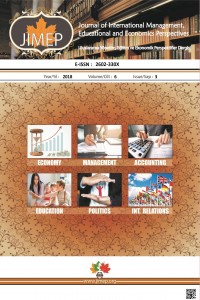BOLÂHENK NÛRİ BEY’E AİT BUSELİK ÂYÎN-İ ŞERÎFİ’NİN İLK PEŞREV’İNİN MAKÂM VE GEÇKİ BAKIMINDAN İNCELENMESİ
Abstract
Hammâmîzâde
İsmâil Dede Efendi, Bestekâr Rıfat Bey, Dellâlzade İsmâil Dede, Şeyh Mehmet
Rızâ Efendi gibi dönemin mûsikî üstadları halkasında yetişmiş dinî ve dindışı
formlarda eserler bestelemiş olan Klâsik Türk Mûsikîsi’nin 19. yüzyıldaki en
önemli bestekârlarından Bolâhenk Nûri Bey’in 23 makâmdan iki İlahi, bir Sirto,
dört Kâr, onbir Beste, on dört Semâî, otuz sekiz Şarkı ve Mevlevî Âyîn-i Şerîfi
formunda iki eseri bulunmaktadır. Bûselik ve Karcığar makâmında bestelenen bu
iki eserden Bûselik makâmındaki âyîni ilk kez Yenikapı Mevlevîhânesi’nde
okunmuştur. 1873 yılında İstanbul’da “Mehmed Nûrî” imzalı “Mecmuâ-i Şarkıyyât, Kârhâ
ve Nakşhâ” adında, on sekiz makâmdan birçok eserin sözlerinin yer aldığı bir
güfte mecmusını bastırmıştır. Bolâhenk Nûri Bey’e ait Bûselik Âyîn-i
Şerîfi’nin ilk peşrev’inin makâm ve geçki açısından incelenmesi bu makalenin
konusunu oluşturmaktadır. Bu çalışma ile büyük Türk bestekârı Bolâhenk Nûri
Bey’in bestelerinde kullandığı teknik ve makâmları kullanma anlayışına yönelik
araştırmalar yaygınlaştırılıp onun Klâsik Türk Mûsikîsi eğitimi alacak yeni
nesil tarafından daha iyi anlaşılmasına katkı sağlayacağı düşünülmüştür.
References
- Aksoy, H. (2007). Bolâhenk Nûri Bey, DİA. c.33, İstanbul, 264.Çakar, Ş. (1996). Türk Mûsikîsinde Usûl. İstanbul: Milli Eğitim Basımevi, 286-287.Çevikoğlu, T. (2007). Semâ Töreni ve Mevlevî Âyînleri. Ankara: Anadolu’da İslâm Kültür ve Medeniyeti Diyanet İşleri Başkanlığı Yayınları, 292-310.Demirci, M. (2017). Türk Dinî Mûsikîsinin 200’ü. Ankara: Otto Yayınları, 135.Hatipoğlu, E. (2010). Mevlevihâneler Döneminde Bestelendiği Tespit Edilmiş 46 Ayinin Makâm ve Geçki Açısından Tahlili. Doktora Tezi, Ankara Üniversitesi Sosyal Bilimler Enstitüsü, Ankara, 457.İnal, İ. M. K. (1958). Hoş Sada Son Asır Türk Mûsikîşinasları. İstanbul: Maarif Basımevi, 235.Kutluğ, Y. F. (2000). Türk Musikisinde Makamlar. İstanbul: Yapı Kredi Yayınları, 159.Küçük, S. (2003). Mevleviliğin Son Yüzyılı. İstanbul: Simurg Yayınları, 33.Özalp, N. M. (2000). Türk Mûsikîsi Tarihi II. İstanbul: Milli Eğitim Basımevi, 26.İnternet Kaynaklarıhttp://www.guzelsanatlar.gov.tr/TR,3706/mevlevi-ayini.html adresinden 01 Eylül 2018 tarihinde edinilmiştir.
ANALYSIS OF THE FIRST PRELUDE OF BUSELİK ÂYİ̂N-İ ŞERÎF BY BOLÂHENK NURİ BEY IN TERMS OF MAQAM AND TRANSPOSITION
Abstract
Bolâhenk Nuri Bey, who
composed religious and non-religious works, grown in the educational circle of
the musical masters of the period such as Hammâmîzâde İsmâil Dede Efendi,
Bestekâr Rıfat Bey, Dellâlzade İsmâil Dede, and Şeyh Mehmet Rızâ Efendi and was
one of the most important composers in the field of Classical Turkish Music in
the 19th century, has two hymns, one Sirto, four Kârs, eleven Beste’s, fourteen
Semaîs, thirty-eight songs in 23 maqams, and also two works in the form of
Mevlevî Ayîn-î Şerîfi. Among those two works composed in the maqams of Buselik
and Karcığar, the liturgy in the form of Buselik was performed in Yenikapı
Mevlevihane for the first time. In 1873 in İstanbul, he published a journal of
lyrics including numerous compositions in eighteen maqams called “Mecmuâ-i
Şarkıyyât, Kârhâ and Nakşhâ”, by the title “Mehmed Nuri”. In this paper, the
first prelude of Buselik Ayîn-i Şerîfi by Bolâhenk Nuri Bey was analyzed in
terms of maqam and transposition. It is thought that this study will popularize
the researches related to the perception of employing techniques and maqams
used by Bolâhenk Nuri Bey, the great Turkish composer, and to contribute to the
young people who plan to receive Classical Turkish Music education in better
understanding his musical identity.
References
- Aksoy, H. (2007). Bolâhenk Nûri Bey, DİA. c.33, İstanbul, 264.Çakar, Ş. (1996). Türk Mûsikîsinde Usûl. İstanbul: Milli Eğitim Basımevi, 286-287.Çevikoğlu, T. (2007). Semâ Töreni ve Mevlevî Âyînleri. Ankara: Anadolu’da İslâm Kültür ve Medeniyeti Diyanet İşleri Başkanlığı Yayınları, 292-310.Demirci, M. (2017). Türk Dinî Mûsikîsinin 200’ü. Ankara: Otto Yayınları, 135.Hatipoğlu, E. (2010). Mevlevihâneler Döneminde Bestelendiği Tespit Edilmiş 46 Ayinin Makâm ve Geçki Açısından Tahlili. Doktora Tezi, Ankara Üniversitesi Sosyal Bilimler Enstitüsü, Ankara, 457.İnal, İ. M. K. (1958). Hoş Sada Son Asır Türk Mûsikîşinasları. İstanbul: Maarif Basımevi, 235.Kutluğ, Y. F. (2000). Türk Musikisinde Makamlar. İstanbul: Yapı Kredi Yayınları, 159.Küçük, S. (2003). Mevleviliğin Son Yüzyılı. İstanbul: Simurg Yayınları, 33.Özalp, N. M. (2000). Türk Mûsikîsi Tarihi II. İstanbul: Milli Eğitim Basımevi, 26.İnternet Kaynaklarıhttp://www.guzelsanatlar.gov.tr/TR,3706/mevlevi-ayini.html adresinden 01 Eylül 2018 tarihinde edinilmiştir.
Details
| Primary Language | Turkish |
|---|---|
| Journal Section | Articles |
| Authors | |
| Publication Date | December 7, 2018 |
| Acceptance Date | November 20, 2018 |
| Published in Issue | Year 2018 Volume: 6 Issue: 3 |

